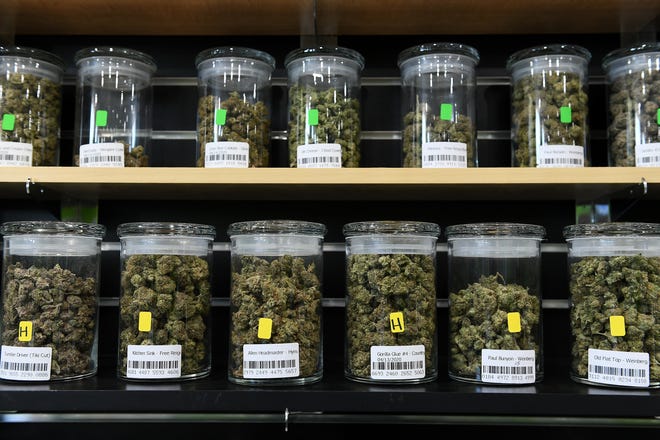
Detroit to issue recreational marijuana licenses in summer 2021
Detroit — Starting January, longtime city residents will be the first to apply for certification and secure recreational marijuana licenses by the summer, city officials announced Wednesday.
Mayor Mike Duggan and councilman James Tate unveiled a timeline urging residents eager to jumpstart their marijuana business to begin by applying for Detroit Legacy certification opening online Jan. 19. The first licenses could be issued to qualified residents as soon as June.
The city’s long-awaited ordinance for recreational marijuana, which was unveiled in October, guarantees no less than half of all licenses awarded will go to legacy residents.
“It’s by far the most controversial provision,” Duggan said. “The city will not issue a license to any business unless 50% of the licenses in that category are Detroiters. Which means if you’re from outside the city, you can’t get a license unless a Detroiter already has one. We’ll never go below 50%.”
The plan, city leaders say, was crafted to ensure residents disproportionately affected by the nation’s failed “War on Drugs” will have an equitable opportunity to participate in an industry that’s estimated to yield $3 billion in annual sales. In late November, the city council unanimously approved the ordinance.
“It was imperative for us to ensure we right that wrong,” Tate said. “We have individuals who are making a very good living on marijuana today, the same plant that created this situation of mass incarceration around our country in the city of Detroit, so this is an opportunity for us.”
Applicants can qualify for the “legacy” certification if they’ve lived in Detroit for 15 of the last 30 years; lived in Detroit for 13 of the last 30 years and are low-income; or lived in Detroit for 10 of the last 30 years and have a past marijuana-related conviction.
Legacy Detroiters will receive benefits including reduced fees, technical assistance and a six-week period when only legacy Detroiter applications will be reviewed before the rest of the public by the city’s Civil Rights, Inclusion and Opportunity Department.
Legacy Detroiters will be able to purchase city-owned land at 25% of the fair market value and all application fees be slashed to 1% of the total cost.

“These are for real Detroiters, those who have roots in the community,” Duggan said. “Or you can qualify as a business legacy, owned and controlled 51% by individuals with the legacy certification.”
Despite the scrutiny they face, “Detroit is ready for this huge lift,” Tate said.
He added it was rare to witness overwhelming excitement about an ordinance but said it’s because “now (residents) have that sense of opportunity and hope.”
How to apply
The adult-use law is expected to go into effect in January and Detroiters can start by reviewing the process at detroitmeansbusiness.org.
Starting Jan. 19, the website will open for applications for legacy certification. Applicants will also need state certification through the Michigan Marijuana Regulatory Agency.
The state requirements include a $6,000 fee with reductions for those involved in social equity programs. Applicants must provide the state information on the company and have a personal background check.
The state process could take two to three months and Duggan said Detroit applicants can begin the city process in January before state prequalifications are complete.
Starting April 1, Detroiters and general applicants will able to apply for licenses through the Buildings, Safety Engineering and Environmental Department.
Legacy Detroiters will be the first applicants reviewed for licenses starting May 1. General applications will be reviewed starting Aug. 1.
City licensing fees will cost $1,000, but only $10 for legacy Detroiters.
“We are going to change the inequity on Detroit versus non-Detroit businesses,” Duggan said. “We’re doing everything we can to create every opportunity for Detroiters to start these businesses.”
The city will license up to 75 adult-use retailers, the same number it allows for medical marijuana provisioning centers. Officials said it amounted to one dispensary every two square miles in the city.
Applicants will need:
- Detailed business plans
- Three years of income tax returns
- Authorizations for background checks
- Property tax clearances and clearances of any blight
- An address for the business
Those without an address can obtain a provisional license valid for one year and for information on properties. Detroit officials have said only four of the city’s 46 medical marijuana dispensaries — permitted under a law approved by Detroit’s council in 2018 — are owned by residents.
Mitzi Ruddock, a 40-year-old Detroit single mother with a past marijuana conviction, told The News that having a seat at the table made a difference.
“I and many other Detroiters have sacrificed so much to see the day that brings generational wealth to our children through legal cannabis businesses,” said Ruddock.
















